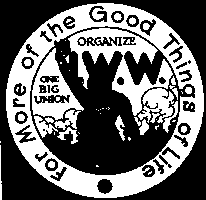JOHN GOLDEN AND THE LAWRENCE STRIKE
(JOE HILL) (1912)
Tune: "A Little Talk With Jesus"





Another Joe Hill song, which evolved around the I.W.W.-led strike against the Lawrence, Massachusetts, textile mills in 1912, was "John Golden and the Lawrence Strike." This song... satirized the activities of John Golden, an American Federation of Labor official who attempted to gain control of the strike.A majority of the unskilled laborers in the textile mills of Lawrence were recently arrived immigrants who received wages barely sufficient to sustain life. Abot half of Lawrence's 85,000 population over the age of fourteen had jobs in the mills, and health and living conditions were so deplorable that a local physician maintained that thirty-six out of every one hundred men and women working in the mills died before the age of twenty-five.45
The strike was precipitated by a law passed by the Massachusetts legislature reducing the work-week from fifty-six to fifty-four hours for women and children, beginning January 1, 1912. Workers struck spontaneously when the mill owners reduced wages to coincide with the reduced work-week.46
The I.W.W., which had been increasing its strength among the mill workers since 1907, sent Joseph Ettor to lead the strikers. Arturo Giovannitti, representing the Italian socialist newspaper Il Proletario, arrived from New York to take charge of strike relief and to work with Ettor. After a riot in which a woman striker was killed, Ettor and Giovannitti were jailed on charges of inciting violence and being accessories to murder. Shortly thereafter, William D. ("Big Bill") Haywood, secretary of the I.W.W., Elizabeth Gurley Flynn, and several other organizers arrived to fill the void.47
Prior to the walkout, no labor organization had succeeded in unifying the varied nationalities working in the Lawrence mills into a single unit. However, as indicated by a United States Senate investigation, the Lawrence strike developed into an organized struggle of 20,000 to 25,000 workers united in demanding an increase in wages and improved working conditions. The strike provided the mass of Lawrence workers their first opportunity to redress grievances. "The Lawrence strike was a social revolution."48
In addition to fighting the mill owners and many of Lawrence's leading citizens who had formed an anti-strike committee, the striking workers found themselves in a pitched battle with another union, the United Textile Workers of America, an affiliate of the American Federation of Labor. John Golden, president of the United Textile Workers, journeyed to Lawrence seeking to influence the Central Labor Union (the Lawrence branch of the United Textile Workers), to gain control of the dispute and to keep its members -- skilled laborers -- from joining the walkout. Golden was quoted in Solidarity as having said, "We must prevent the so-called labor strike leaders, the physical forcists, from getting control of the situation."49
The I.W.W. charged that the mill owners, in particular William Wood, president of the American Woolen Company, wanted Golden to gain control of the strike, because they, in turn, could control him.
Lincoln Steffens, who visited Lawrence during the conflict, reported in Solidarity that workers hooted whenever John Golden was mentioned. "They understood that 'John Golden' was a signal to laugh and to yell. And he and his name, you understand, were used to symbolize the A.F. of L. 'aristocratic labor' and a suspicious intimacy with capital."50....
As a result of Golden's dealings with the mill owners, the skilled workers who had walked out were offered a five percent pay increase and subsequently voted to return to work, deserting the mass of unskilled workers. Nevertheless, the unskilled continued the strike, demanding among other things a fifteen percent pay increase, double pay for overtime, and no dicrimination against strikers. In mid-March, the mill owners, fearing that government intervention and investigation would jeopardize the high tariff on woolens, finally agreed to bargain. Offers of pay increases from five to twenty-five percent, time-and-a-quarter for overtime, and no discrimination against strikers led to the end of the strike on March 24, 1912.52


In Lawrence, when the starving masses struck for more to eat
And wooden-headed Wood tried the strikers to defeat,
To Sammy Gompers wrote and asked him what he thought,
And this is just the answer that the mailman brought:CHORUS:The preachers, cops and money-kings were working hand in hand,
A little talk --
A little talk with Golden
Makes it all right, all right;
He'll settle any strike,
If there's coin enough in sight;
Just take him up to dine
And everything is fine --
A little talk with Golden
Makes it right, all right.
The boys in blue, with stars and stripes were sent by Uncle Sam;
Still things were looking blue 'cause every striker knew
That weaving cloth with bayonets is hard to do.John Golden had with Mr. Wood a private interview,
He told him how to bust up the "I double double U."
He came out in a while and wore the Golden smile.
He said: "I've got all labor leaders skinned a mile."John Golden pulled a bogus strike with all his "pinks and stools."
He thought the rest would follow like a bunch of crazy fools.
But to his great surprise the "foreigners" were wise,
In one big solid union they were organized.FINAL CHORUS:
That's one time Golden did not
Make it right, all right;
In spite of all his schemes
The strikers won the fight.
When all the workers stand
United hand in hand,
The world with all its wealth
Shall be at their command.


